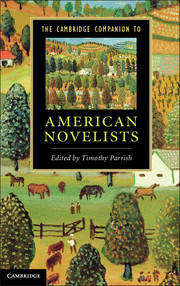Book contents
- Frontmatter
- Contents
- Contributors
- Introduction
- 1 James Fenimore Cooper
- 2 Nathaniel Hawthorne
- 3 Herman Melville
- 4 Harriet Beecher Stowe
- 5 Mark Twain
- 6 Henry James
- 7 Edith Wharton
- 8 Theodore Dreiser
- 9 Willa Cather
- 10 F. Scott Fitzgerald
- 11 Ernest Hemingway
- 12 William Faulkner
- 13 Henry Roth
- 14 Djuna Barnes
- 15 Zora Neale Hurston
- 16 Richard Wright
- 17 Raymond Chandler
- 18 Ralph Ellison
- 19 J. D. Salinger
- 20 Patricia Highsmith
- 21 Vladimir Nabokov
- 22 Jack Kerouac
- 23 Saul Bellow
- 24 Kurt Vonnegut
- 25 John Updike
- 26 Thomas Pynchon
- 27 Toni Morrison
- 28 Philip Roth
- 29 Don DeLillo
- 30 Cormac McCarthy
- Guide to Further Reading
- Index
- References
5 - Mark Twain
Published online by Cambridge University Press: 05 December 2012
- Frontmatter
- Contents
- Contributors
- Introduction
- 1 James Fenimore Cooper
- 2 Nathaniel Hawthorne
- 3 Herman Melville
- 4 Harriet Beecher Stowe
- 5 Mark Twain
- 6 Henry James
- 7 Edith Wharton
- 8 Theodore Dreiser
- 9 Willa Cather
- 10 F. Scott Fitzgerald
- 11 Ernest Hemingway
- 12 William Faulkner
- 13 Henry Roth
- 14 Djuna Barnes
- 15 Zora Neale Hurston
- 16 Richard Wright
- 17 Raymond Chandler
- 18 Ralph Ellison
- 19 J. D. Salinger
- 20 Patricia Highsmith
- 21 Vladimir Nabokov
- 22 Jack Kerouac
- 23 Saul Bellow
- 24 Kurt Vonnegut
- 25 John Updike
- 26 Thomas Pynchon
- 27 Toni Morrison
- 28 Philip Roth
- 29 Don DeLillo
- 30 Cormac McCarthy
- Guide to Further Reading
- Index
- References
Summary
Mark Twain (1835–1910) first made an impact on the American literary scene with “The Jumping Frog of Calaveras County,” published in 1865, the year the Civil War ended. The dates are not just coincidental, for sectional animosity among its readers could be put aside in this comic story of the American frontier, written by an adopted westerner in a distinctively “American” style. As soon as Simon Wheeler starts to speak, any idea of a standardized national “literary” language crafted according to a model of eastern cultural propriety effectively falls away. Wheeler’s opening statement, “There was a feller here once by the name of Jim Smiley, in the winter of ’49 – or may be it was the spring of ’50 – I don’t recollect exactly, somehow” (JF, 9), is the first step in a literary journey that leads straight to Adventures of Huckleberry Finn (1884) – “You don’t know about me, without you have read a book by the name of ‘The Adventures of Tom Sawyer,’ but that ain’t no matter,” (HF, 17) – and from there to Salinger’s The Catcher in the Rye (1951) and Russell Banks’s Rule of the Bone (1995).
Hemingway’s pronouncement that “all modern American literature comes from one book by Mark Twain called Huckleberry Finn” may be both overquoted and exaggerated, but the novel stands nonetheless as a crucial intervention in the nation’s literary history. The radical impact of Twain’s use of the vernacular as he gives Huck, his ill-educated and disreputable first-person narrator, control of his novel cannot be underestimated. The American vernacular had of course seen literary use before the “Jumping Frog” story.
- Type
- Chapter
- Information
- The Cambridge Companion to American Novelists , pp. 42 - 51Publisher: Cambridge University PressPrint publication year: 2012

